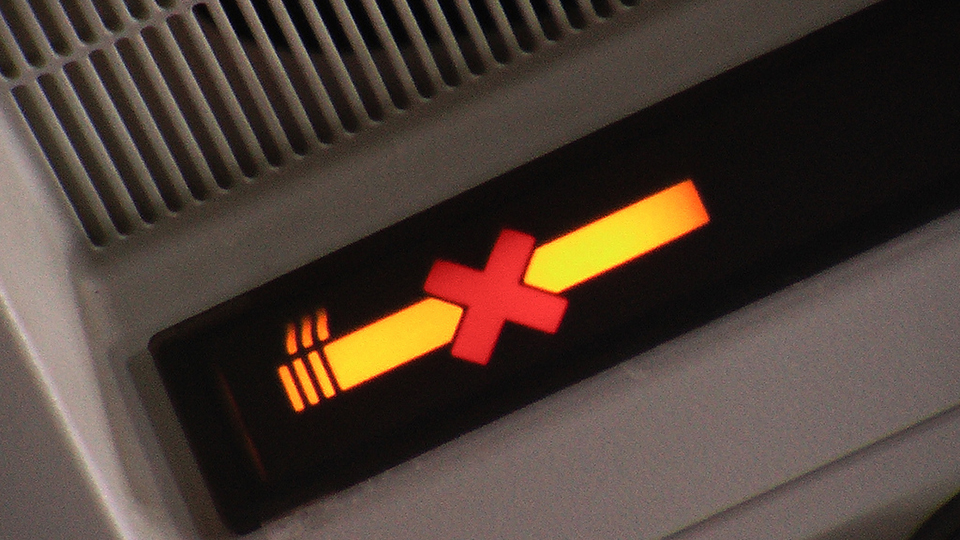
If you're looking for government work in Flagler County, Florida, don't bother applying if you are a smoker.
Beginning October 1, anyone applying for a county job in Flagler will face a new kind of drug test. While drug testing as a form of pre-employment screening is not unusual, the drug they are now looking for is. In addition to marijuana and other street drugs, county employers will now be testing for nicotine.
The Flagler County Board of Commissioners voted in August to ban new employees from smoking. Under the new law, once an employee passes the nicotine test, s/he will be required to sign an affidavit not only promising to abstain from any tobacco product use moving forward -- but affirming that s/he did not use any tobacco products within a year before being employed.
According to a report posted on The Florida Dash, “The ban includes not just cigarettes, but pipes, and cigars. Chewing tobacco is a definite no with the new system. Even the newfangled e-cigarettes are also banned for anyone wanting to work for Flagler County.”
Under the new law, any applicant who tests positive for nicotine will be automatically rejected and unable to apply for another county job for a year. And any employee found to be using a tobacco product is subject to immediate firing.
The American Civil Liberties Union has cried foul, stating potential violations based on the 4th and possibly the 9th and 14th amendments. However, the case has yet to be made historically for any constitutional protections of smokers.
But there are even bigger concerns. Under Obamacare, which will come into effect at the start of 2014, people with pre-existing conditions cannot be denied medical coverage or charged more than those who do not have pre-existing conditions.
The preliminary outline of the new federal healthcare program, the Affordable Care Act, states that insurance companies have the option of raising smokers' coverage costs by 50%. But according to Dr. Mohammad Akhter, chairperson of the Health Benefit Exchange Authority in Washington, DC, tobacco addiction is a pre-existing condition.
On Monday, April 10, the District of Columbia along with Massachusetts, Vermont and Rhode Island, voted to ban insurers from making the 50% leap for smokers. Soon after, Connecticut and California followed suit, affirming that in states where smoking is recognized as a pre-existing condition, it is illegal for insurers to charge smokers higher rates.
Going the other way, Alaska and Colorado rejected the argument to treat smoking as a pre-existing condition and voted to allow the 50% increase for smokers (something surprising, perhaps, coming from a state that just legalized the sale, growth and distribution of marijuana).
Now, Flagler County's decision to bar smokers from county employment may indicate that Florida could lean that way as well. The state's Republican Senator Marco Rubio most recently tried to eliminate Obamacare with a last ditch effort to defund the federal government at the end of this month.
Flagler County Board Chairman Nat McLaughlin cited the rising costs of health insurance and lower employee productivity as reasons to institute the smoking ban. He and other supporters of the ban cited a study conducted by Micah Berman, an assistant professor in health services management at Ohio State University, that showed that companies can pay nearly $6,000 more each year for every employee who smokes.
Berman, in an email to Occupy.com about the Fagler County decision, said his study was not intended to influence a policy position, in Florida or anywhere else. However, he stood by his findings as accurate evidence that required further exploration.
“Our study was the first attempt to quantify the costs imposed by employees who smoke on their employers. We are hoping that others will review our methods and add their insights or critiques, but that has not happened yet,” Berman wrote.
“We were not attempting to calculate an exact cost — a given employer's costs may be higher or lower than $5,800 per employee who smokes — but we believe our study provides a useful estimate of the extent of smoking-related costs.”
Now, Fagler County is in a wait-and-see period as the ACLU deliberates its next action — and the future cost to Florida's smokers hangs in the balance.
3 WAYS TO SHOW YOUR SUPPORT
- Log in to post comments












